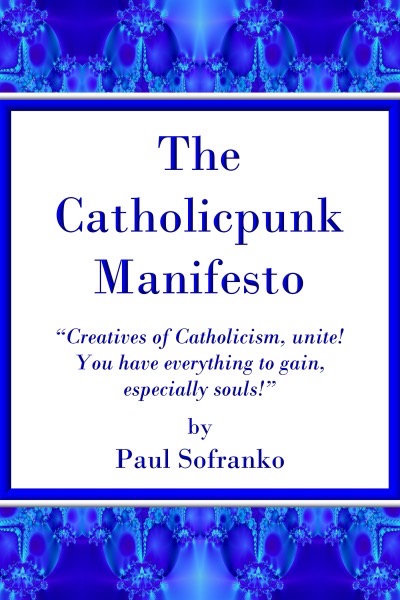At the root of The Catholicpunk Manifesto is the notion that the contemporary world has lost its way and needs redirecting. Jesus Christ is “The Way, the Truth, and the Life,” and He established the Catholic Church to promulgate and defend His teachings, all with the idea of guiding souls to Heaven. Therefore, the Catholicpunk Movement that will hopefully arise from the book is one method by which Catholic creatives will participate in that mission.
All Catholic Christians are called to evangelize. It springs forth from our Baptism and especially from our Confirmation. We are to be ‘Christ-bearers’ to others.
As I said in this earlier post:
It’s one thing to preach the Gospel by talking about Jesus; it has worked successfully for 2,000 years. But there are additional avenues that the Catholic evangelist can walk down in attempting to convert the world for Jesus.
One method is creating a fictional world that is in marked contrast to our own. I have a belief, unsure where I got it, it might be an actual Original Thought, or it might be derived from someone else, that technology is a sign of a Fallen world. We read in Genesis 3 that Adam and his descendants have to work by the sweat of their brow. Before this, theologians had thought that Adam and Eve were people who had their needs met by God. They didn’t have to ‘work’ for their food. They dwelt in Paradise and had it easy. But that was spoiled by their rebellion and henceforth people have to struggle to meet their needs.
Society is rushing headlong into deeper decadence and depravity; these were motivating factors in my writing the book. And I do not think that the fact that our technology is also developing at an exponential rate is just a coincidence. Technology is not evil in itself; it’s just a tool. And since Adam after the Fall needed tools to meet his and Eve’s needs, tools have been part and parcel of our march down through the millennia. Often for good; but often for evil. But always to make life easier in response to its difficulties. And this may have moral or immoral qualities.
Rather than continue in this post on technological development, I’ll switch to the “creating a fictional world that is in marked contrast to our own” point I mentioned earlier.
While we will probably never return to an idyllic agrarian past, except perhaps as a highly positive or proactive response to a post-apocalyptic scenario, we could take the example of JRR Tolkien’s Shire, and create stories set in an ‘idealized’ non-technological world. While not practically advocating such a future, (except for the post-apocalyptic idea in the previous sentence) creating an idealistic, hopeful setting, and providing therapy for contemporary folk, can at the same time offer radical solutions or alternatives to contemporary problems. How? Have you ever heard the advice about “aim for the highest, so that if you miss, you’ll still land higher than if you settled on a lower target?” That isn’t the exact wording, I searched and kept coming up with Andrew Carnegie quotes and other non-relevant things like song lyrics. But you get the idea. “Don’t sell yourself short,” is another way of putting it. Now, take that concept and extend it to society and culture as a whole. Fundamental problems require radical solutions. Aspiring to create a slower, more peaceful, and humane world by intentionally limiting technology may get people to take a look around and give pause to advancing ever further towards a dehumanizing future. A more balanced society, with technology being responsibly developed with due regard for morality, ethics, and maintaining our essential humanity.
This can be attempted with agrarian fiction, be it science-fiction or fantasy. If you say that science-fiction cannot be ‘agrarian,’ then your perception is biased or you never read Clifford Simak and pastoral science-fiction. One of the definitions of science-fiction that I read when I was growing up and reading Asimov, Clarke, Heinlein, and so on was something like it is ‘humanity’s response to the advances in science and technology.’ So, what if that response to science and technology was to rein it in? And so this is a perfect concept for Catholicpunkers.
This is a continuation of the previous post, “Peter Maurin and Catholicpunking” and develops it a bit.
Are you a creative Catholic? "The Catholicpunk Manifesto" is my new book exhorting Catholics to apply their faith to change the culture for the better!
Know someone, perhaps yourself, who might like Catholic devotionals for alcoholics? Please take a look at my books! "The Stations of the Cross for Alcoholics" and "The Recovery Rosary: Reflections for Alcoholics and Addicts" (Thank you!!)

 My new book, inspired by St. Maximilian Kolbe and my way of working out Total Consecration to Mary, is now available in paperback through Amazon! Some of you were waiting for this! (Thank you in advance!)
My new book, inspired by St. Maximilian Kolbe and my way of working out Total Consecration to Mary, is now available in paperback through Amazon! Some of you were waiting for this! (Thank you in advance!)